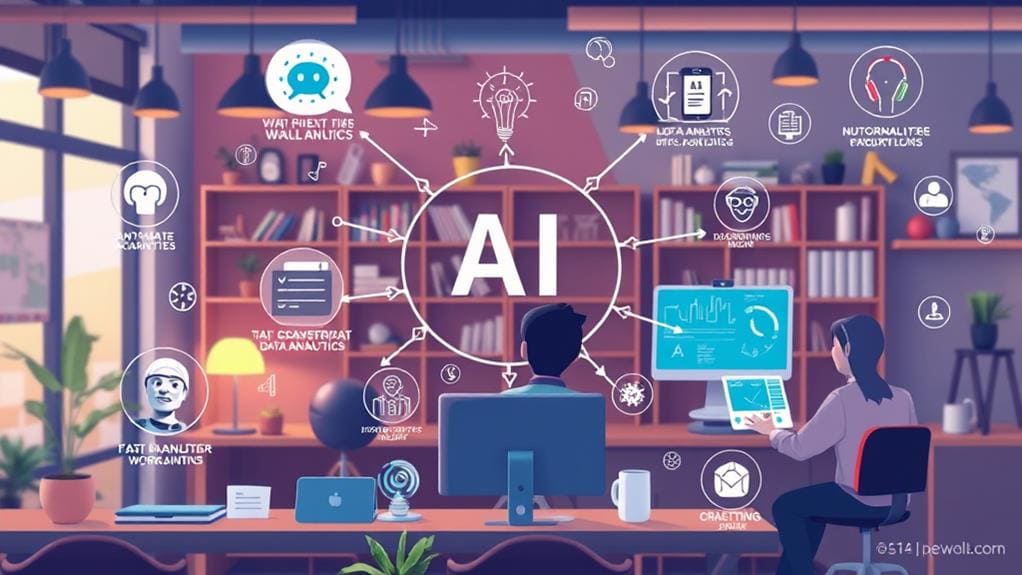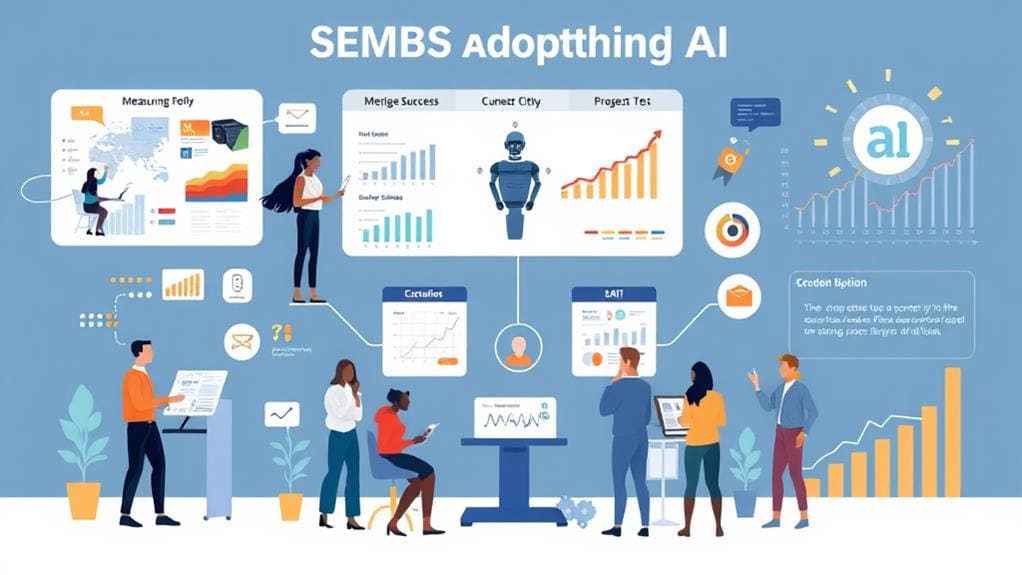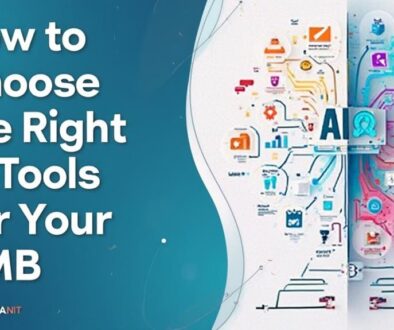AI Implementation: A Step Towards Future-Proofing Your SMB
Implementing AI is a strategic move for small and medium-sized businesses (SMBs) aiming to future-proof their operations. By automating repetitive tasks and enhancing data analysis, AI considerably boosts operational efficiency and decision-making capabilities. Understanding specific business needs and setting clear objectives are crucial steps in this transformation. Furthermore, employing AI tools can cultivate customer insights while maintaining data security through robust governance frameworks. Investing in team upskilling further guarantees your workforce adapts to technological changes. As you explore the implementation process, you'll discover more essential strategies to strengthen your business's competitive edge in the marketplace.
Key Takeaways
- Assess business needs and operational bottlenecks to identify key areas where AI can improve efficiency and decision-making.
- Implement task automation solutions to streamline repetitive tasks, allowing teams to focus on higher-value work.
- Utilize data analysis tools for actionable insights and predictive analytics, enhancing strategic decision-making.
- Establish robust data governance and security measures to protect sensitive information and ensure compliance.
- Invest in upskilling your team to adapt roles effectively and foster a culture of innovation in the face of AI integration.
Understanding AI Basics

Grasping the fundamentals of artificial intelligence (AI) is essential for small and medium-sized businesses (SMBs) looking to leverage technology for growth and efficiency. At its core, AI refers to the development of systems that can perform tasks typically requiring human intelligence, including problem-solving, reasoning, and decision-making. By understanding AI fundamentals, businesses can access new opportunities for optimizing operations and enhancing customer experiences.
One of the pivotal components of AI is machine learning, a subset that focuses on the ability of computers to learn from data and improve over time without explicit programming. This powerful technology allows SMBs to analyze vast amounts of information to identify patterns, make predictions, and automate decision-making processes.
For instance, machine learning can facilitate personalized marketing campaigns by analyzing customer behavior and preferences, leading to increased engagement and conversion rates.
Furthermore, the integration of AI in business operations can greatly enhance efficiency. Automated tasks, from customer support chats to data entry, free valuable human resources, allowing employees to concentrate on strategic initiatives that drive growth.
This not only promotes a more agile business model but also fosters an innovative workplace culture that encourages creativity and problem-solving.
Ultimately, understanding AI fundamentals empowers SMBs to navigate the evolving technological landscape confidently. As businesses embrace machine learning and its transformative potential, they position themselves to thrive in an increasingly competitive market, realizing the freedom to innovate and grow unencumbered by outdated practices.
Identifying Business Needs
To effectively implement AI solutions, SMBs must first identify their specific business needs and challenges. A clear understanding of these needs is essential, as it allows businesses to align AI initiatives with their overarching business objectives. Start by conducting a thorough assessment of current processes and pinpoint areas where AI can create efficiencies or enhance decision-making. This assessment not only highlights operational bottlenecks but also reveals opportunities for innovation.
Involving key stakeholders in this identification process is important. Engaging various team members across departments guarantees a well-rounded view of the business landscape and prioritizes unique challenges that may require AI solutions. Open discussions can foster a collaborative environment where diverse perspectives contribute to a more detailed understanding of needs. Stakeholder involvement can also promote buy-in for upcoming initiatives, as employees feel their inputs are valued and relevant.
Once the specific business needs are clarified, SMBs can proceed to set measurable objectives tailored to the desired outcomes of the AI implementation. This step is significant, as it establishes a roadmap for success and facilitates tracking progress along the way.
Key AI Tools for SMBs

In today's competitive landscape, small and medium-sized businesses (SMBs) can greatly enhance their operations through the strategic use of AI tools.
Essential categories such as task automation solutions, data analysis tools, and communication enhancements empower SMBs to streamline workflows, make informed decisions, and improve customer interactions.
Exploring these key tools will reveal how they can transform everyday processes and drive growth for SMBs.
Task Automation Solutions
Task automation solutions have emerged as a vital component for small and medium-sized businesses (SMBs) working to enhance operational efficiency and reduce costs. By embracing intelligent task automation, businesses can streamline repetitive activities, ultimately allowing team members to focus on higher-value tasks. This not only fosters creativity but also cultivates an environment ripe for innovation.
Consider the following advantages of task automation:
- Process optimization: Automating mundane tasks minimizes human error and accelerates project timelines.
- Workflow efficiency: Integration of automation tools can synchronize various business processes, ensuring smooth communication between departments.
- Resource allocation: Enhanced task management allows for better distribution of human resources, increasing overall productivity.
As SMBs navigate this transformative landscape, the right task automation solutions can reveal newfound freedom, allowing businesses to be more agile and responsive to market changes.
Investing in these technologies will lead to sustainable growth and a competitive edge, setting the groundwork for a successful future. Adopting a strategic approach to automation today is not just about surviving; it is about thriving.
Data Analysis Tools
Effective decision-making hinges on robust data analysis, making it an essential tool for small and medium-sized businesses (SMBs) seeking to thrive in today's competitive landscape. By leveraging advanced data visualization techniques, SMBs can turn complex information into clear, actionable insights. These visual tools simplify the comprehension of intricate datasets and enhance data integrity.
Moreover, predictive analytics allows companies to foresee future trends, empowering them to make proactive decisions. Through customer segmentation, businesses can tailor their strategies to meet varied consumer needs, enhancing customer experience and loyalty.
Trend forecasting further aids in anticipating market shifts, ensuring SMBs remain agile and competitive. Real-time reporting is vital, as it provides immediate access to key performance indicators, enabling swift adjustments to strategies.
Sentiment analysis enriches this toolkit by offering insights into customer perceptions. Understanding public sentiment not only informs marketing efforts but also shapes product development.
Communication Enhancements
A robust communication strategy is essential for small and medium-sized businesses (SMBs) aiming to enhance collaboration, improve customer interactions, and streamline operations. By leveraging AI-driven tools, SMBs can greatly optimize their communication processes.
Key enhancements include:
- Virtual Assistants: These tools can automate repetitive tasks, freeing employees to focus on more strategic initiatives.
- Chatbot Technology: Deploying chatbots can facilitate immediate customer support, answering inquiries 24/7 and improving overall client satisfaction.
- Communication Platforms: Unified systems integrate various communication channels, ensuring seamless exchanges among team members and clients alike.
Embracing these technologies not only fosters effective team collaboration but also empowers businesses to tackle communication challenges head-on.
SMBs that implement AI solutions can enhance responsiveness, tailor customer experiences, and foster a culture of innovation. As your company looks to the future, mindful integration of these communication enhancements is crucial for maintaining a competitive edge.
Harnessing AI allows for greater adaptability, ultimately paving the way for seamless operations while providing the freedom to explore new opportunities.
Implementing these strategies today will position your SMB for long-term success and resilience in an ever-evolving landscape.
Data Management and Security
Steering through the complexities of data management and security is essential for small and medium-sized businesses (SMBs) looking to harness the power of artificial intelligence. As your organization embraces AI, understanding data privacy and compliance regulations becomes imperative to safeguarding sensitive information and maintaining customer trust.
Effective data governance strategies will help establish a framework for managing data access, guaranteeing that all employees enforce best practices in handling information. Implementing robust cybersecurity measures is also essential. This includes conducting regular risk assessments to identify vulnerabilities and deploying data encryption methods to protect information both in transit and at rest.
Furthermore, a solid incident response plan is necessary for addressing any data breaches promptly. With the increasing threat landscape, organizations must be prepared to act swiftly to mitigate risks and protect their data assets.
Shifting data to the cloud offers significant advantages, but it's paramount to prioritize cloud security. This involves establishing secure configurations, regular audits, and compliance checks to guarantee that your cloud environment adheres to the necessary standards.
Lastly, remaining attuned to changes in compliance regulations empowers your SMB to stay ahead of legal obligations, enhancing its reputation. By integrating these data management and security practices, you not only empower your workforce but also create a resilient foundation for leveraging AI technologies effectively.
This proactive approach sets a precedent for sustainable growth while reinforcing data integrity and security in an ever-evolving digital landscape.
Integration Strategies

Implementing artificial intelligence within small and medium-sized businesses (SMBs) requires thoughtful integration strategies that align with existing infrastructure and business processes. Ensuring that AI initiatives enhance operations rather than disrupt them is essential for successful implementation. By focusing on strategic planning, SMBs can achieve a seamless shift into the AI landscape.
To effectively integrate AI, consider the following strategies:
- Leverage cloud solutions for efficient data management. Cloud platforms provide the flexibility and scalability needed for AI deployment, making it easier to manage resources.
- Establish vendor partnerships. Collaborating with technology providers can lead to greater support and access to cutting-edge tools tailored for your business needs.
- Prioritize stakeholder involvement. Engaging key players in the process fosters buy-in and encourages a culture open to innovation.
In addition, budget allocation is vital. Adequate funds should be allocated not only for technology but also for change management initiatives that prepare teams for new tools and methodologies.
Additionally, scalability considerations must be at the forefront of planning. Ensuring that AI solutions can grow with your business will safeguard investments and promote sustainability.
Setting realistic implementation timelines is another important component. Allowing enough time for assessments, adjustments, and testing phases lays the foundation for successful integration.
Furthermore, enhancing customer engagement through AI can greatly impact business performance, making the integration journey not just a technical upgrade but a transformative experience for stakeholders.
Upskilling Your Team
Upskilling your team is a crucial component of successfully integrating AI into small and medium-sized businesses (SMBs). As the digital landscape evolves, equipping your staff with the necessary skill sets guarantees they remain competitive and engaged. Central to this process is skill assessment, which helps identify existing competencies and gaps within your team. By accurately understanding these areas, you can tailor training programs that complement organizational goals while fostering personal growth.
Implementing structured training programs not only promotes knowledge sharing but also encourages team collaboration. Facilitate workshops and seminars that stimulate dialogue around AI technologies, allowing employees to share insights and experiences. This collaborative spirit builds a culture of continuous learning, where every team member feels empowered to contribute to the organization's success.
Furthermore, competency mapping is essential in understanding how current roles will adapt in response to AI implementation. Employees may require new skills or enhanced expertise to meet evolving job demands. Regularly revisiting and updating competency maps guarantees that your training initiatives remain relevant and impactful.
Engaging your employees in this transformative journey fosters a sense of ownership and enthusiasm, which is crucial for encouraging role adaptation. Through ongoing development opportunities, your team will not only thrive in their individual careers but also drive your SMB toward innovation and excellence.
In this rapidly changing landscape, investing in your team's skills is an invaluable strategy for future-proofing your enterprise.
Measuring Success

Measuring the success of AI initiatives in small and medium-sized businesses (SMBs) is fundamental to understanding their impact and ensuring continuous improvement. By evaluating the effectiveness of these technologies, businesses can refine their strategies, ultimately leading to enhanced performance and growth.
To achieve this, it is essential to establish clear success metrics and performance indicators that align with the organization's goals.
Consider focusing on the following key areas to gauge success in your AI implementations:
- Cost Savings: Understand how AI contributes to reducing operational costs and optimizing resource allocation.
- Customer Satisfaction: Measure improvements in customer interactions and the overall client experience as a result of AI-driven solutions.
- Efficiency Gains: Assess the impact of AI on productivity and efficiency within internal processes and workflows.
By identifying specific success metrics, SMBs can track their progress and make data-driven decisions. For instance, analyzing customer feedback post-AI implementation can reveal significant insights into satisfaction levels, while operational costs can be monitored to evaluate the return on investment.
Moreover, it is important to create a feedback loop that incorporates findings into future AI strategies. This iterative approach not only fosters a culture of learning but also empowers teams to harness AI's potential fully.
Ultimately, measuring success in AI initiatives equips SMBs with the knowledge to adapt and thrive in an ever-evolving market landscape, ensuring a future founded on innovation and resilience.
Future Trends in AI
As the business landscape continues to transform, the future of artificial intelligence (AI) in small and medium-sized businesses (SMBs) promises to be both dynamic and impactful.
With the rapid development of emerging technologies, SMBs have the opportunity to leverage AI for industry-specific applications, enhancing their operations and driving unprecedented customer experience.
However, as the integration of AI advances, it is essential to address the ethical considerations and emerging AI regulations that will shape this frontier. Organizations must navigate these guidelines responsibly to build trust and credibility with stakeholders.
In addition, the scalability of AI solutions will determine their effectiveness across diverse business sizes, allowing SMBs to adapt and grow without compromising efficiency.
Workforce implications are also significant. As AI takes on more tasks, SMBs will need to rethink roles and invest in employee training to harness the potential of their augmented workforce.
Frequently Asked Questions
What Are the Costs Associated With AI Implementation for Smbs?
The costs associated with AI implementation for small and medium-sized businesses (SMBs) primarily involve an initial investment and ongoing maintenance.
The initial investment encompasses software, hardware, and potential consulting fees for strategy development. Ongoing maintenance costs include software updates, staff training, and technical support.
Despite these expenditures, the long-term benefits of enhanced efficiency and productivity can greatly outweigh the costs, empowering SMBs to thrive in a competitive landscape.
How Can AI Improve Customer Service for Small Businesses?
Imagine a customer receiving immediate assistance at any hour, their individual preferences noted like cherished mementos.
AI enhances customer service by providing personalized interactions that make clients feel valued. Automated responses swiftly address common inquiries, ensuring that no question goes unanswered.
This seamless blend of technology and human touch fosters loyalty and satisfaction, empowering small businesses to focus on growth while building enduring relationships with their clientele.
What Industries Benefit Most From AI Applications?
Industries experiencing significant advantages from AI applications include healthcare advancements, where predictive analytics improve patient care.
Retail optimization enhances inventory management, and manufacturing efficiency is achieved through automation.
Financial forecasting benefits from AI's data analysis capabilities, while marketing automation drives targeted campaigns.
Additionally, logistics management gains efficiency, education enhancement personalizes learning experiences, and agriculture innovation leverages AI for crop monitoring.
These sectors illustrate AI's transformative potential, empowering businesses and enriching customer interactions.
Is AI Technology Difficult for Small Businesses to Adopt?
Adopting AI technology can pose challenges for small businesses, particularly concerning AI training and data privacy.
The learning curve associated with integrating AI solutions may require significant investment in training and resources.
Additionally, ensuring data privacy amidst AI use is paramount, as small businesses must navigate compliance with regulations while protecting customer information.
However, with proper planning and support, small businesses can effectively embrace AI to enhance efficiency and drive growth.
What Are the Most Common Challenges in AI Integration?
Integrating AI can seem challenging, yet the benefits often outweigh the obstacles.
Common hurdles include ensuring data privacy, which can raise employee concerns, and the need for effective employee training to utilize new technologies.
Additionally, technology compatibility issues can complicate implementation. A solid change management process and a well-defined integration strategy are essential.
Ultimately, successful ROI measurement will provide insights that reinforce the value of investing in AI solutions for your business.
Conclusion
In the swiftly changing landscape of technology, the implementation of artificial intelligence stands as a beacon of opportunity for small and medium-sized businesses. Embracing AI not only addresses immediate operational challenges but also paves the way for sustainable growth and innovation. As organizations harness the power of AI through strategic integration and team development, they position themselves to navigate future market shifts with agility and resilience, ensuring not merely survival, but thriving in an increasingly competitive environment.




